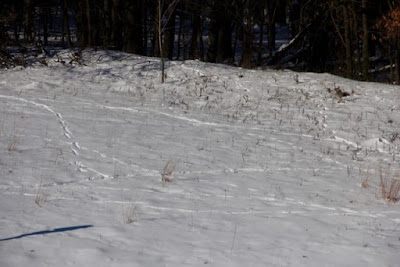 |
| tracks are stories in the snow
Photo by J. Harrington
|
I'm surprised we haven't more owls living nearby, or that the local pack of coyotes hasn't come closer to the house under cover of darkness. Of course, that's when the squirrels are in dens or nests well above the reach of coyotes. From time to time we've had barred owls roosting near the house, but none this Winter that I've seen or heard. Maybe in the next month or two a pair will pick a nearby tree for this year's nest and we'll hear their calls as we take the dogs for their early morning predawn walks.
Yesterday we noted that today is the holiday honoring Martin Luther King and wrote a little about one of his thoughts on environmental justice. Today, we want to call your attention to this excerpt, which originally appear in common ground magazine:
"A few scholars have noted the ecological quality of King’s thought. In a 2006 speech, Larry Rasmussen, author of the recent book Earth-Honoring Faith, called King “one of the great ‘ecological’ thinkers of the 20th century,” while noting our failure to remember him as such. Other scholars such as Dianne Glave and Robert Bullard highlight King’s involvement with the Memphis sanitation workers’ strike as “inherently environmental” and a precursor of 21st century environmental justice activism. Apart from these brief mentions, the ecological nature of his thought has remained largely unexplored."My natural inclination is to model my perspective and attitude after someone like Edward Abbey, who notes that "A patriot must always be ready to defend his country against his government." I also realize that Dr. King offers a rationale for such a defense with thoughts like this: "In a television interview from July 1967, King said, “It would be foolhardy for me to work for integrated schools or integrated lunch counters and not be concerned about the survival of the world in which to be integrated.” It seems to me we'll make progress better and faster if we find ways to include the thoughts of both Martin Luther King and Edward Abbey in the stories we try to write about social and environmental justice. I doubt any of these themes can be separated. They are all interrelated.
I look at the world
By Langston Hughes
I look at the worldFrom awakening eyes in a black face—And this is what I see:This fenced-off narrow spaceAssigned to me.I look then at the silly wallsThrough dark eyes in a dark face—And this is what I know:That all these walls oppression buildsWill have to go!I look at my own bodyWith eyes no longer blind—And I see that my own hands can makeThe world that's in my mind.Then let us hurry, comrades,The road to find.
********************************************
Thanks for visiting. Come again when you can.
Please be kind to each other while you can.
No comments:
Post a Comment